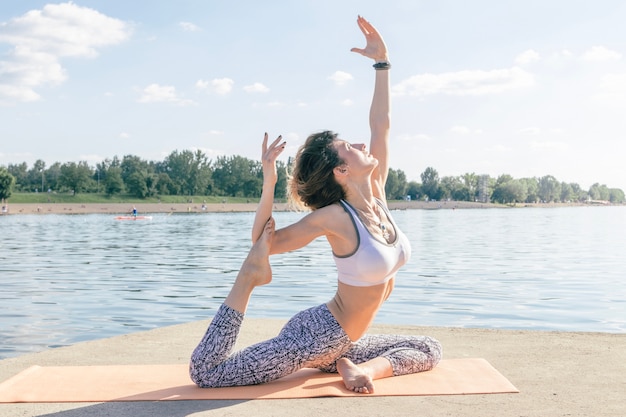
A yoga body isn’t just about being flexible. This ancient practice can actually boost your memory, heart health, and bone strength, says Anna Magee.
These days, everyone seems hooked on yoga poses like downward dogs and cat cows. Brits are now spending an impressive £790 million annually on yoga classes and mats. While some people dive into unique variations like rage yoga, naked yoga, paddleboard yoga, horseback yoga, and even dog yoga, science is increasingly proving the substantial benefits of traditional yoga.
Researchers from UCLA discovered that a three-month yoga and meditation course improved age-related brain issues more effectively than memory exercises. Another study found it also helped breast cancer survivors sleep better.
Lucy Edge, 53, once an advertising executive, chose yoga over prescribed antidepressants when she went through severe depression. She took a six-month break, went to India to learn yoga, and returned with a sense of happiness and fulfillment that she had never experienced before. Now, Lucy has authored three books on yoga and created Yoga Meds, which lists evidence supporting yoga for treating arthritis, insomnia, and obesity, among other conditions.
If you’re looking to sharpen your mind beyond crossword puzzles and Sudoku, it might be time to refine your warrior pose. UCLA’s study involved 25 adults over 55 and compared 12 weeks of memory exercises with yoga and meditation. Those who practiced yoga showed more improvement in their spatial and visual memory, reduced depression and anxiety, and increased resilience to stress. While this study is small, it suggests the need for more research into yoga’s benefits in maintaining heart and brain health as we age.
No need for intense headstands to gain the benefits. Participants in the study practiced Kundalini yoga for one hour a week. This gentle style incorporates breathing techniques, meditation, and chanting mantras. They also did 20 minutes of Kirtan Kriya daily, involving chanting, hand movements, and light visualization.
For heart health, yoga may be just as beneficial as conventional exercise. In 2014, a review published in the European Journal of Preventative Cardiology indicated that yoga might lower heart disease risk as effectively as brisk walking. Yoga reduces stress, a significant factor in heart disease, by lowering blood pressure and heart rate and decreasing the likelihood of blood clots.
For anxiety, stress, and depression, especially prevalent after cardiac events or surgeries, yoga has shown promise, according to Dr. Mike Knapton of the British Heart Foundation. Yoga can improve blood pressure, cholesterol, and weight—key risk factors for heart disease.
For beginners looking to reduce stress, Charlotte Watts, a yoga teacher and author, suggests gentle yoga poses. Anna Ashby, a senior teacher at Triyoga Studios in London, recommends Restorative yoga for its deep relaxation benefits, where postures are supported by bolsters and cushions and held for up to 12 minutes.
Yoga also aids in reducing back pain. Sarah Shone, a physiotherapist and yoga teacher, developed yoga classes that 87% of participants found reduced their pain. The National Institute of Clinical Excellence (NICE) advocates yoga for lower back pain, with Shone emphasizing its more profound benefits and aiming to train more physiotherapists in using yoga.
Yoga strengthens pelvic floor muscles and is weight-bearing, which can help increase bone density. It’s adaptable for different fitness levels and health conditions, making it accessible for everyone.
If starting out, inform your instructor about any health issues and opt for gentle styles, such as Hatha or Iyengar, to begin with. For specific conditions like back pain, consult your doctor about subsidized yoga courses through exercise referral schemes.
Good yoga props can enhance your practice. Consider where you’ll keep your mat, whether it’s on display or for easy transport. A thicker mat can protect your joints, essential if you experience knee or wrist pain.
Healthista recommends the Elephant Cork Yoga mat from Valka Yoga, known for its eco-friendly materials and supportive features for comfortable practice. The mat’s surface becomes grippier with sweat, making it ideal for hot yoga. It also resists odors naturally and comes with a carry strap and a one-year replacement warranty. Matching cork yoga blocks can help with stability and making challenging poses more accessible.
If flexibility isn’t your strength, yoga can still help. Consider trying Yin or Restorative yoga for relaxation, Vinyasa Flow for an energetic workout, Iyengar for precise posture holding, Anusara for a dynamic alignment-focused practice, and Yoga Therapy for healing from injuries or illnesses.

